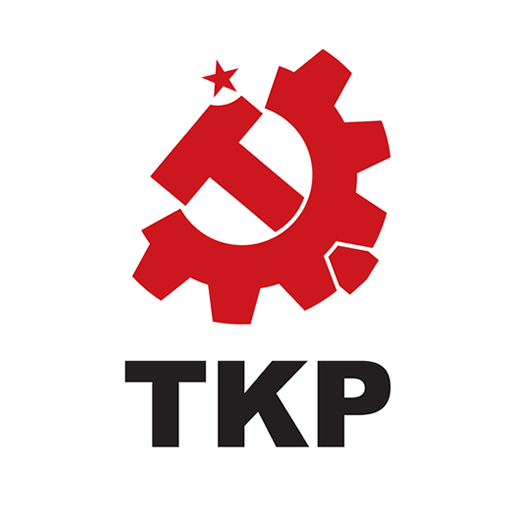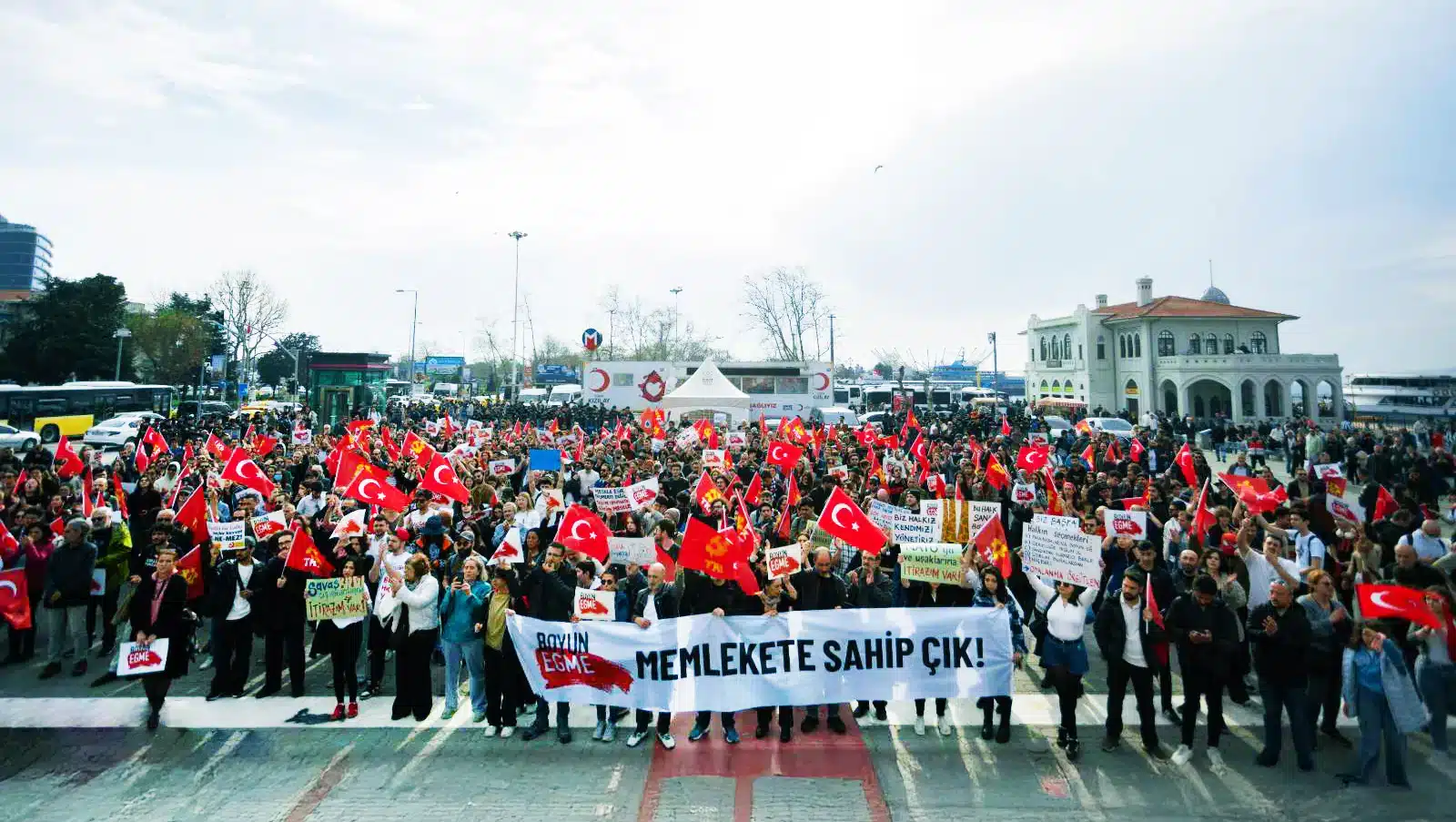The Central Committee of the Communist Party of Turkey (TKP) has released a statement regarding recent political developments in the country and the consumption boycott by the opposition, which was practiced for a day last week.
In the statement, TKP also responded to a recent remark by an AKP official who told demonstrators, “You will kneel”. TKP declared: “We will not kneel to the government”, and added “We will kneel before the heroes of the War of Independence, before the workers who lost their lives in workplace murders, and before the children of this country murdered during the Gezi Resistance.
TKP called for three days of demonstrations, each day highlighting one of these themes.
***
WE WILL NOT KNEEL TO THE GOVERNMENT
1. Our people, especially students, are exhibiting a historical resistance against the government’s attempt to usurp the right to vote and to be elected in a process that is largely unorganized and scattered. This resistance is expressed through different media and forms that help broad segments of society take a political stance. Although there is much that can be said about each form of protests, from public demonstrations to product boycotts, it is clear that these media and forms that increase participation create a highly significant social climate as a result.
2. It should not be forgotten that the objection of our citizens from different ideological and political tendencies to the arbitrariness of the government, to the oppression imbued with arrogance and tyranny like “The old Turkey is gone” will power the sense of justice and culture of standing tall that we will need very much in the upcoming period and even in critical historical turning points. This power means beyond “better than nothing” and should be expressed with adjectives such as “good,” “pleasant” and “beneficial”.
3. However, social dynamics cannot remain suspended for long. Turkey’s main opposition CHP (Republican People’s Party) Chairperson Özgür Özel and his team, currently playing or are forced to play the biggest role in the emergence of these reactions, are acting with the concern of keeping the reactions in a balance that will not sabotage the negotiations with the ruling AKP but will also strengthen their own hand. Again, in terms of the many-sided struggle ongoing within the CHP, the leanings of the social segments that are currently mobilized, whether they are CHP members or not, are of considerable importance. In short, this social movement is getting significant and being used both in terms of the AKP government’s preferences regarding CHP and the struggle within CHP itself.
4. The only result of sanctifying and absolutizing the political and ideological uncertainty or diversity of a social movement is that the political and ideological boundaries of the established system determine that movement. Indeed, the glorification of emotional and superficial associations instead of organizational ones based on a political program, the legitimization of the distinction between “good capital and bad capital” are some evidences that the positive picture we emphasized above, if left to its own devices, will turn into a surrender to the system and its current epitome, the AKP government.
5. However, the most serious problem of the period we are going through, if not intervened, is that the class conflict might completely be covered up. In Turkey, the condition for a social movement to succeed and gain permanent positions, and moreover to pave the way for revolutionary transformations that will make this country livable, is for it to be characterized by working people. The participation of mainly youth without a future, and poor and desperate workers in the demonstrations that started with the arrest of İstanbul Metropolitan Municipality Mayor Ekrem İmamoğlu does not imply a class character. Although it is not expected that every protest directly stems from the capital-labor conflict, there are a series of ways for a social struggle practice to gain a class character, from the form of protests to slogans, from demands to the political goals set forth.
6. The fact that the product and broadcast boycott is one of the most alarming forms of protest for the government, and moreover that it helps a very large segment of society to engage in political action, should not cause us to underestimate some of the difficulties this form of protest has. Boycott is the most inconvenient method of struggle for the working class to participate in a social reaction in an organized manner. It should be known that the working class has lost its former power in Turkey for more than one reason does not make it unimportant, on the contrary, it makes it more vital than ever as the only social force that will relieve the political and social pressure.
7. Encouraged by those who find such a transformation untimely, people who do not want the struggle against injustice, and the attack on the right to vote and to be elected to evolve into a struggle against the exploitative system today are trying to prevent millions of people who are against the AKP government in Turkey from questioning the dominance of big capital. However, the latest movement has triggered anger against social inequalities, revealed an unyielding and uncompromising feeling against the holding-sect system, and moreover, has mobilized those who insist on anti-imperialism in a way that the CHP leadership and some do not want at all. In this period when a motive, even if implicit, is looking for a breakthrough, it is necessary to ensure that a united social reaction against the AKP continues to grow stronger, and on the other hand, to make bold interventions that will direct these reactions ideologically and politically to the foundations of the current social system in Turkey.
8. In this sense, the Communist Party of Turkey (TKP) will continue to strengthen the line of struggle that it previously summarized with the phrase of “dual responsibility” and will represent a line of struggle that will help question the supremacy of capital that has become almost muted in the noise created by the discourse of the “Erdogan’s one-man rule.”
9. Continuity, integrity and consistency are essential in our struggle. Every step we take, every call and statement we make must be in the same direction. We will not step back even a millimeter from our line that is based on the necessity of our people to position themselves against capitalist exploitation and imperialism, and we will make the goal of socialism a concrete option on a working class patriotism-oriented, enlightened and republican basis.
We will do all of this, and we will not kneel before the government.
We cannot kneel in the face of exploitation, plunder, looting, and injustice.
We will not kneel out of fear.
We will not bow down or surrender.
We kneel only out of respect for the memory of working class patriots, revolutionaries, and workers.
If we are called to kneel, we accept.
But we kneel before those who deserve it.
Monday: WE WILL NOT KNEEL TO THE GOVERNMENT. WE KNEEL BEFORE THE HEROES OF THE WAR OF INDEPENDENCE.
Tuesday: WE WILL NOT KNEEL TO THE GOVERNMENT. WE KNEEL BEFORE THE WORKERS WHO LOST THEIR LIVES IN WORKPLACE MURDERS.
Wednesday: WE WILL NOT KNEEL TO THE GOVERNMENT. WE KNEEL BEFORE THE CHILDREN OF THIS COUNTRY MURDERED DURING GEZI RESISTANCE
We begin on Monday at 20:00 with the demonstrations in Beşiktaş (İstanbul), Ulus (Ankara), and Alsancak (İzmir).



